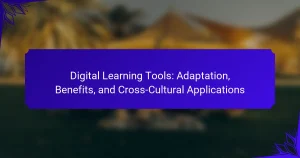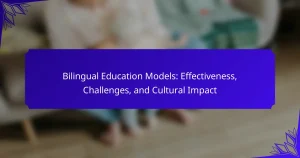Cultural intelligence is essential for enhancing collaboration and communication in global workplaces. It presents benefits such as increased employee engagement and innovative problem-solving, while also posing challenges like cultural misunderstandings. Strategies to improve cultural intelligence include targeted training programs, diverse hiring practices, and fostering open dialogue among teams. By addressing these aspects, organizations can create a more inclusive and effective work environment.
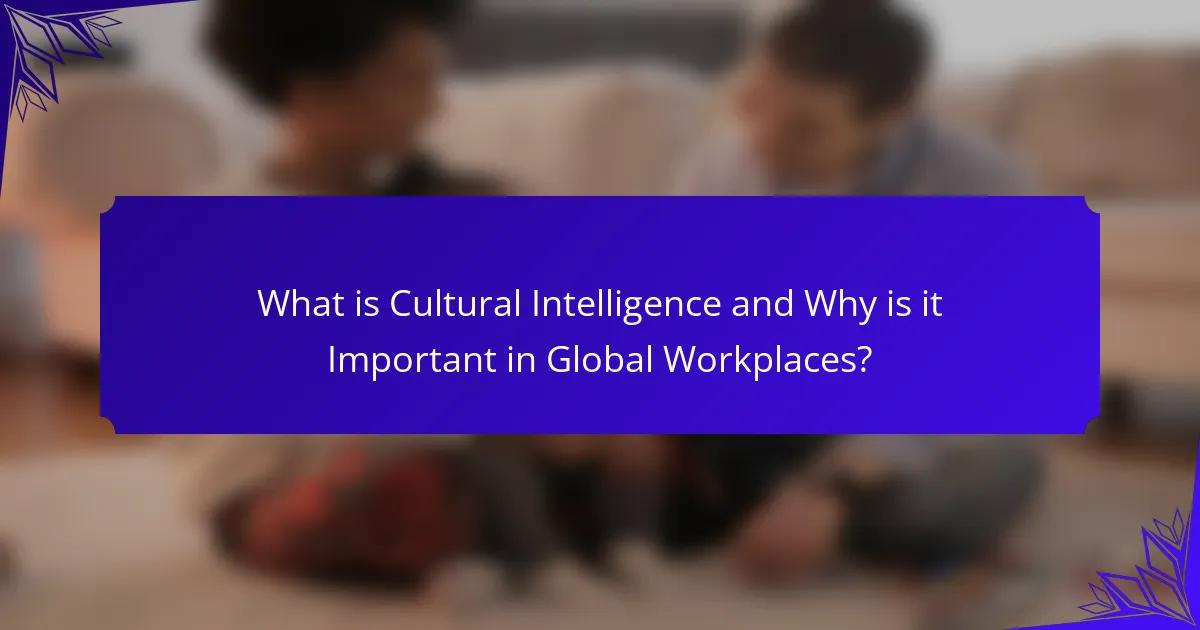
What is Cultural Intelligence and Why is it Important in Global Workplaces?
Cultural intelligence is the ability to understand and adapt to diverse cultural contexts. It is crucial in global workplaces as it enhances collaboration, improves communication, and fosters innovation. Organizations with high cultural intelligence benefit from increased employee engagement and better problem-solving capabilities. However, challenges such as cultural misunderstandings and biases can arise. Strategies to enhance cultural intelligence include training programs, diverse teams, and open dialogue, which help build a more inclusive work environment.
How does Cultural Intelligence impact team dynamics?
Cultural Intelligence enhances team dynamics by fostering understanding and collaboration among diverse members. It improves communication, reduces conflicts, and promotes inclusivity. Teams with high cultural intelligence exhibit better problem-solving capabilities and innovation, as diverse perspectives contribute to creative solutions. As a result, organizations benefit from increased productivity and employee satisfaction.
What role does Cultural Intelligence play in leadership effectiveness?
Cultural Intelligence enhances leadership effectiveness by fostering understanding and adaptability in diverse environments. Leaders with high Cultural Intelligence can navigate cultural complexities, build strong relationships, and motivate teams. This adaptability leads to improved communication and collaboration, ultimately driving organizational success. Moreover, leaders who embrace diverse perspectives can make more informed decisions, enhancing innovation and problem-solving capabilities.
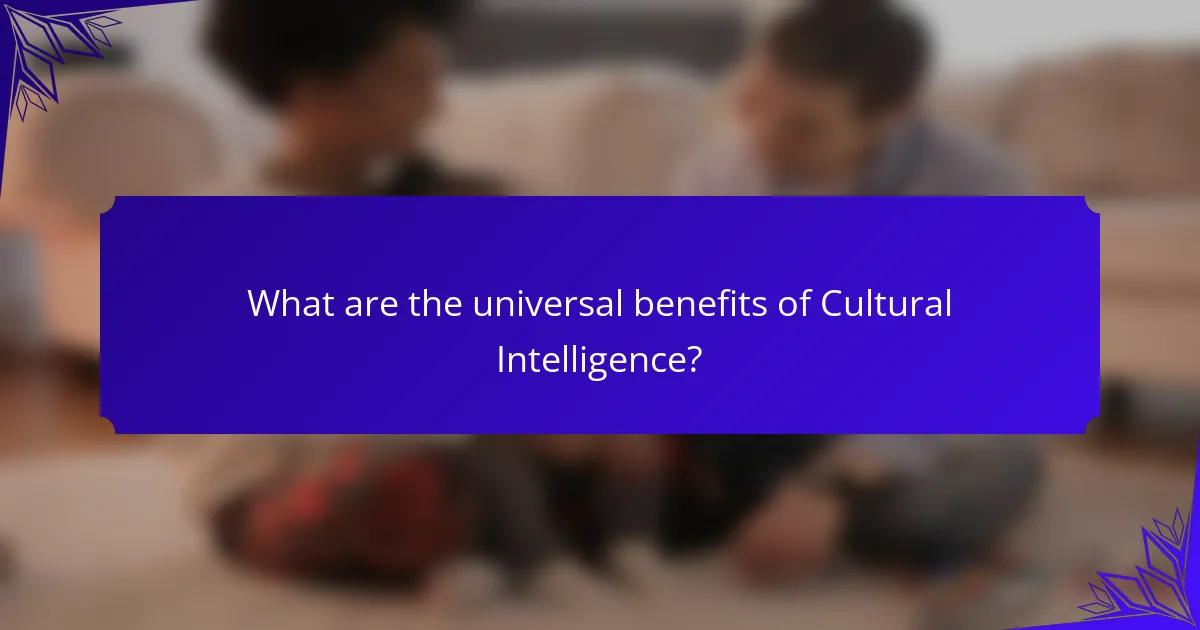
What are the universal benefits of Cultural Intelligence?
Cultural intelligence enhances workplace collaboration, improves communication, and fosters inclusivity. It enables teams to navigate diverse perspectives and adapt strategies effectively. Organizations with high cultural intelligence report increased employee satisfaction and better problem-solving capabilities. As a result, these benefits contribute to a more innovative and competitive business environment.
How does Cultural Intelligence enhance communication?
Cultural Intelligence enhances communication by promoting understanding and respect among diverse teams. It allows individuals to navigate cultural differences effectively, reducing misunderstandings and fostering collaboration. As a result, teams with high cultural intelligence achieve better outcomes and stronger relationships. This unique attribute of cultural intelligence is essential in global workplaces where diverse perspectives drive innovation and success.
What influence does Cultural Intelligence have on employee engagement?
Cultural intelligence significantly enhances employee engagement by fostering inclusivity and understanding in diverse teams. Employees with high cultural intelligence are more likely to communicate effectively, collaborate, and feel valued. As a result, organizations experience increased job satisfaction and productivity. This unique attribute of cultural intelligence enables teams to navigate cultural differences, leading to improved workplace dynamics and reduced conflicts.
In what ways does Cultural Intelligence contribute to conflict resolution?
Cultural Intelligence significantly enhances conflict resolution by fostering understanding and empathy among diverse team members. It enables individuals to recognize cultural differences, leading to more effective communication and collaboration. By valuing diverse perspectives, Cultural Intelligence helps mitigate misunderstandings and promotes a cooperative atmosphere. This approach not only resolves conflicts but also strengthens team cohesion and productivity.
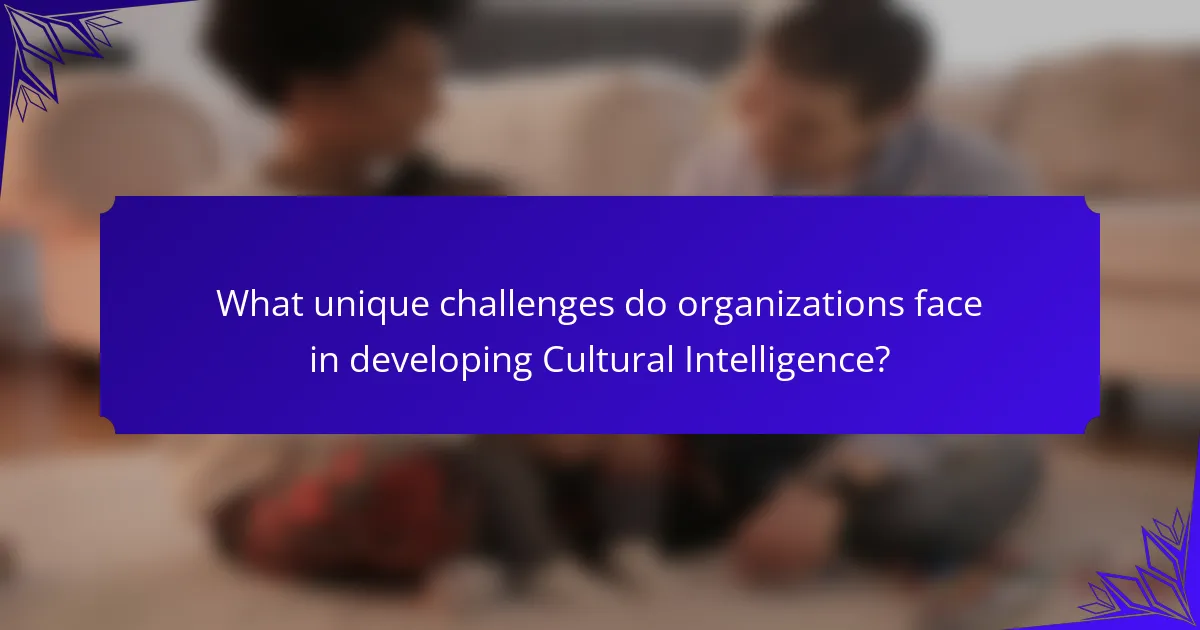
What unique challenges do organizations face in developing Cultural Intelligence?
Organizations face unique challenges in developing Cultural Intelligence due to diverse backgrounds and communication styles. Misunderstandings can arise from differing cultural norms, impacting collaboration. Additionally, limited resources for training and development hinder effective cultural awareness initiatives. Resistance to change within teams may also obstruct progress, as individuals may cling to familiar practices. Addressing these challenges requires tailored strategies that promote inclusivity and ongoing education.
How do cultural biases affect workplace interactions?
Cultural biases can significantly hinder workplace interactions by fostering misunderstandings and conflicts. These biases often lead to misinterpretations of communication styles and work ethics, affecting collaboration and productivity. For example, individuals from collectivist cultures may prioritize group harmony over individual achievement, while those from individualistic cultures may emphasize personal success. Addressing these biases through cultural intelligence training can enhance team dynamics and improve overall workplace effectiveness.
What are the implications of cultural misunderstandings in business?
Cultural misunderstandings in business can lead to reduced collaboration and productivity. They often result in miscommunication, which affects relationships and trust among team members. For instance, differing communication styles may cause frustration and hinder effective negotiation. Additionally, cultural misunderstandings can lead to poor decision-making, as assumptions based on one’s cultural norms may not align with others. Organizations must prioritize cultural intelligence to mitigate these risks and foster a more inclusive workplace. This involves training and strategies that enhance understanding and appreciation of diverse cultures.
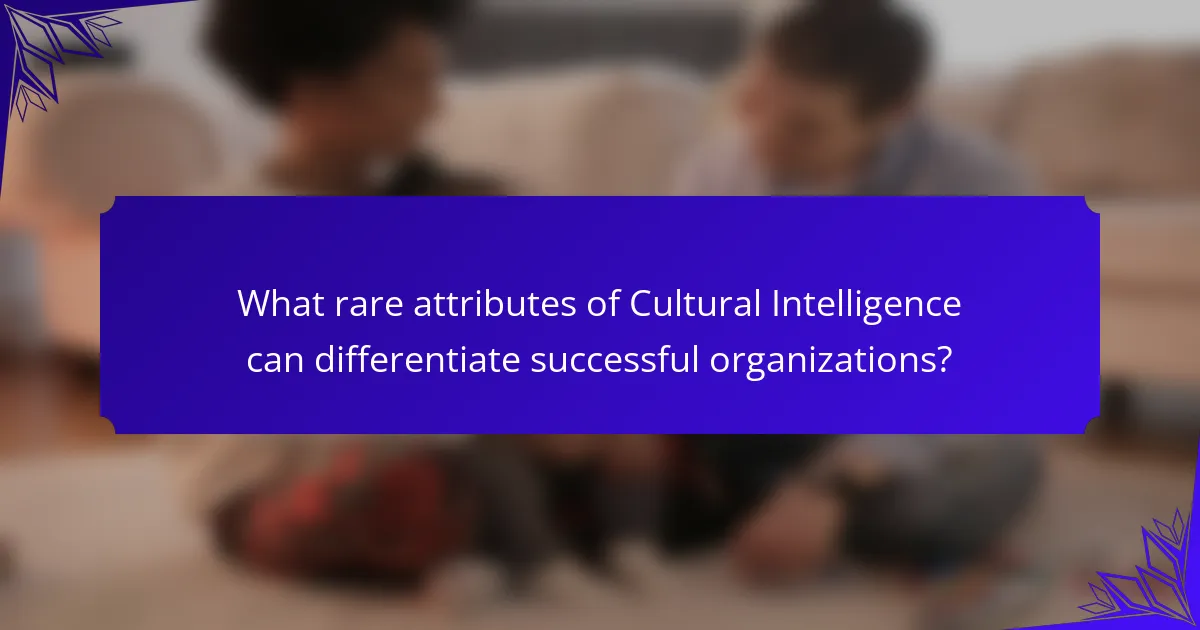
What rare attributes of Cultural Intelligence can differentiate successful organizations?
Organizations with high cultural intelligence often exhibit rare attributes like adaptability, empathy towards diverse perspectives, and innovative problem-solving. These traits enable them to navigate complex global environments effectively. For instance, adaptability allows organizations to adjust strategies based on cultural contexts, enhancing collaboration. Empathy fosters strong relationships among diverse teams, leading to improved communication and trust. Innovative problem-solving emerges from diverse viewpoints, driving creativity and unique solutions. Collectively, these rare attributes differentiate successful organizations in competitive markets.
How does adaptability reflect Cultural Intelligence in diverse settings?
Adaptability is a key component of Cultural Intelligence, enabling effective interactions in diverse settings. It allows individuals to adjust their communication styles and behaviors based on cultural contexts. This flexibility enhances collaboration and minimizes misunderstandings, fostering a more inclusive environment. As a result, teams with high adaptability experience improved problem-solving and innovation, leading to better overall performance in global workplaces.
What unique training programs exist for enhancing Cultural Intelligence?
Unique training programs for enhancing Cultural Intelligence include immersive cultural experiences, online intercultural training modules, and workshops focusing on empathy and communication skills. These programs often incorporate role-playing scenarios and real-world case studies to develop adaptability in diverse environments. Research indicates that organizations implementing such programs see a marked improvement in team collaboration and conflict resolution.
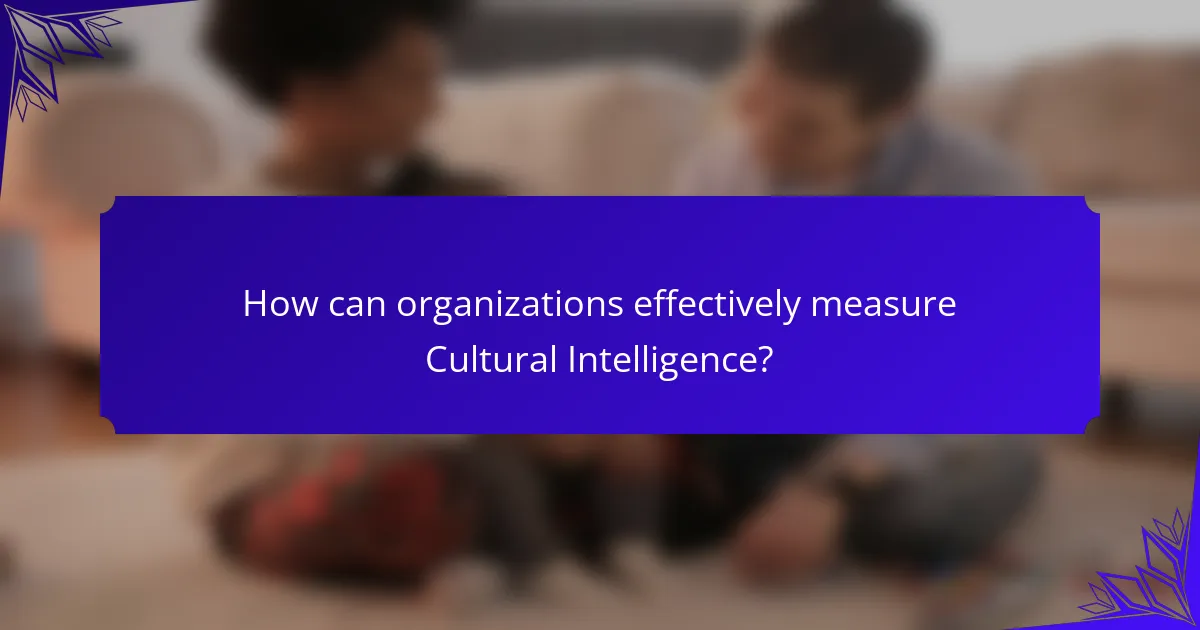
How can organizations effectively measure Cultural Intelligence?
Organizations can effectively measure Cultural Intelligence by utilizing assessments, feedback mechanisms, and performance metrics. Tools like Cultural Intelligence assessments provide quantitative data on individual and team capabilities. Regular feedback from diverse team members enhances understanding of cultural dynamics. Performance metrics can track the impact of Cultural Intelligence on collaboration and productivity. These methods collectively offer a comprehensive view of Cultural Intelligence within the organization, facilitating targeted improvements.
What tools and frameworks are available for assessing Cultural Intelligence?
Various tools and frameworks exist for assessing Cultural Intelligence. Notable examples include the Cultural Intelligence Scale (CQS), which measures cognitive, emotional, and behavioral aspects of cultural intelligence. The CQ Inventory is another tool that evaluates an individual’s capability to function effectively in culturally diverse settings. Additionally, the Global Competence Inventory (GCI) assesses competencies related to cultural adaptability. These frameworks provide structured assessments, guiding organizations in enhancing cultural competence among employees.
How can feedback mechanisms improve Cultural Intelligence assessment?
Feedback mechanisms enhance Cultural Intelligence assessment by providing continuous insights and fostering adaptability. They enable organizations to identify strengths and weaknesses in cultural interactions, facilitating targeted training. Regular feedback allows for real-time adjustments, increasing awareness of cultural nuances. This iterative process promotes a deeper understanding of diverse perspectives, ultimately improving collaboration and performance in global workplaces.
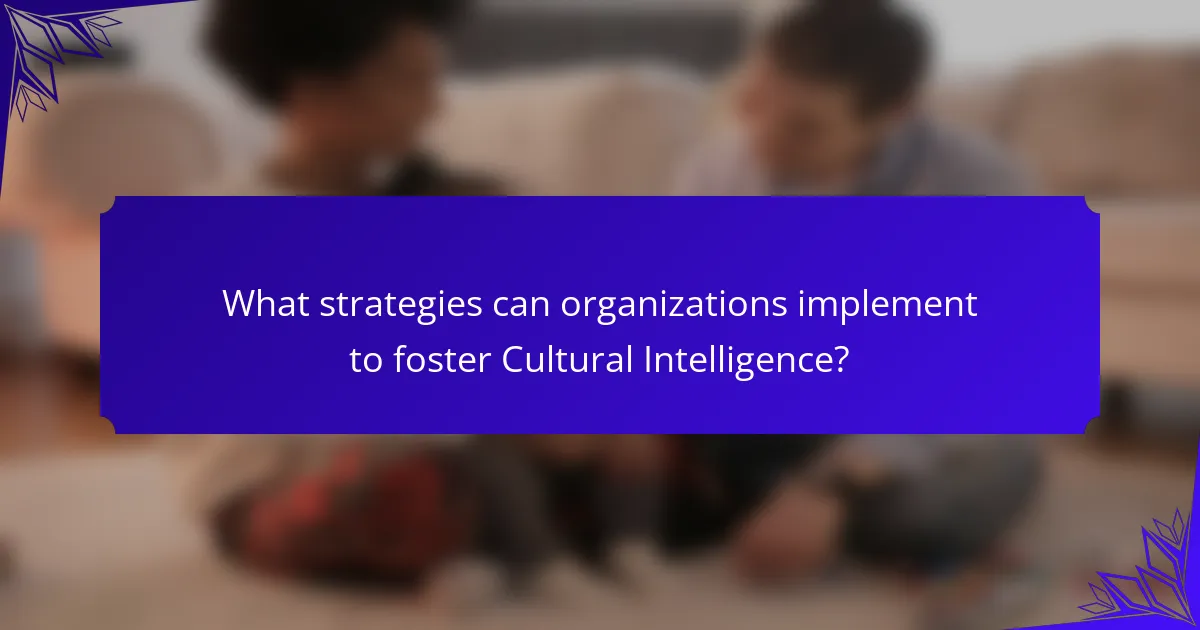
What strategies can organizations implement to foster Cultural Intelligence?
Organizations can implement strategies such as training programs, diverse hiring practices, and collaborative projects to foster Cultural Intelligence. These initiatives enhance understanding of cultural differences and improve workplace dynamics. Training programs focused on cultural awareness can increase empathy and adaptability among employees. Diverse hiring practices ensure a variety of perspectives, enriching team collaboration. Collaborative projects across cultures promote shared learning and strengthen relationships. By prioritizing these strategies, organizations can navigate global challenges effectively and leverage cultural diversity for innovation.
How can inclusive hiring practices enhance Cultural Intelligence?
Inclusive hiring practices significantly enhance cultural intelligence by fostering diverse perspectives. This diversity leads to improved problem-solving and innovation. Organizations that prioritize inclusivity can better understand and navigate cultural nuances, ultimately enhancing collaboration in global teams. A study found that diverse teams can outperform homogeneous ones by 35% in decision-making effectiveness. Embracing inclusive hiring not only enriches workplace culture but also drives better business outcomes.
What role does ongoing training play in developing Cultural Intelligence?
Ongoing training enhances Cultural Intelligence by equipping employees with skills to navigate diverse environments. It fosters adaptability, improves communication, and builds empathy among team members. Continuous education on cultural norms and practices helps mitigate misunderstandings and promotes collaboration. Regular training sessions can lead to increased employee engagement and innovation, as teams become more cohesive and open to diverse perspectives.
What are the best practices for Cultural Intelligence workshops?
Cultural Intelligence workshops should focus on interactive learning, real-world applications, and diverse perspectives. Effective practices include fostering open discussions, utilizing role-playing scenarios, and incorporating case studies. Setting clear objectives enhances engagement and understanding. Regular feedback loops ensure continuous improvement and adaptation to participant needs.
How can mentorship programs support Cultural Intelligence growth?
Mentorship programs significantly enhance Cultural Intelligence by fostering understanding and adaptability in diverse environments. They provide opportunities for individuals to learn from experienced mentors who share insights about different cultures, communication styles, and work practices.
Through mentorship, participants gain unique perspectives that challenge their assumptions and broaden their worldview. This experiential learning approach cultivates empathy and respect for cultural differences, essential for effective collaboration in global workplaces. Additionally, mentorship can address challenges such as cultural biases, equipping mentees with strategies to navigate complex social dynamics.
As a result, organizations that implement mentorship programs often see improved team cohesion and productivity, as employees become more culturally aware and responsive.
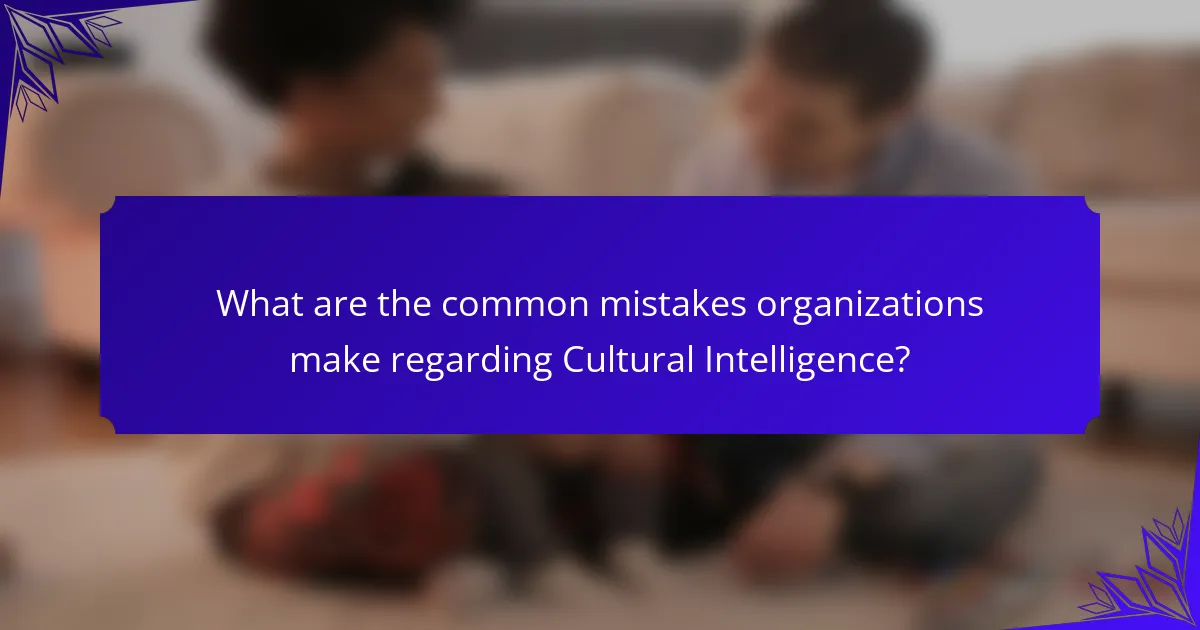
What are the common mistakes organizations make regarding Cultural Intelligence?
Organizations often overlook the importance of training and developing Cultural Intelligence. Common mistakes include failing to recognize cultural differences, neglecting to adapt communication styles, and not fostering an inclusive environment. These missteps can lead to misunderstandings and decreased collaboration. Additionally, organizations may underestimate the time required for cultural integration, leading to superficial engagement rather than deep understanding. Addressing these issues is crucial for enhancing workplace dynamics and achieving global success.
How can miscommunication undermine Cultural Intelligence initiatives?
Miscommunication can significantly undermine Cultural Intelligence initiatives by creating misunderstandings and fostering conflict. When team members from diverse backgrounds misinterpret messages, it leads to decreased collaboration and trust. This misalignment can hinder the effective exchange of ideas, resulting in missed opportunities for innovation. Additionally, cultural nuances in communication styles may not be recognized, further exacerbating tensions. As a result, organizations may struggle to leverage the full benefits of cultural diversity, ultimately impacting overall performance and employee satisfaction.
What pitfalls should be avoided in Cultural Intelligence training?
Cultural Intelligence training can fail if it lacks practical application, overlooks local context, or ignores participant engagement. Avoiding these pitfalls is crucial for effective training outcomes.
1. Insufficient real-world scenarios: Training should incorporate relevant case studies to enhance understanding.
2. Neglecting cultural nuances: Failing to address specific local customs can lead to misunderstandings.
3. Lack of interactive elements: Engaging participants through discussions or role-playing fosters deeper learning.
4. One-size-fits-all approach: Tailoring content to different cultural backgrounds increases relevance and effectiveness.
5. Ignoring feedback: Regularly collecting and acting on participant feedback improves future training sessions.
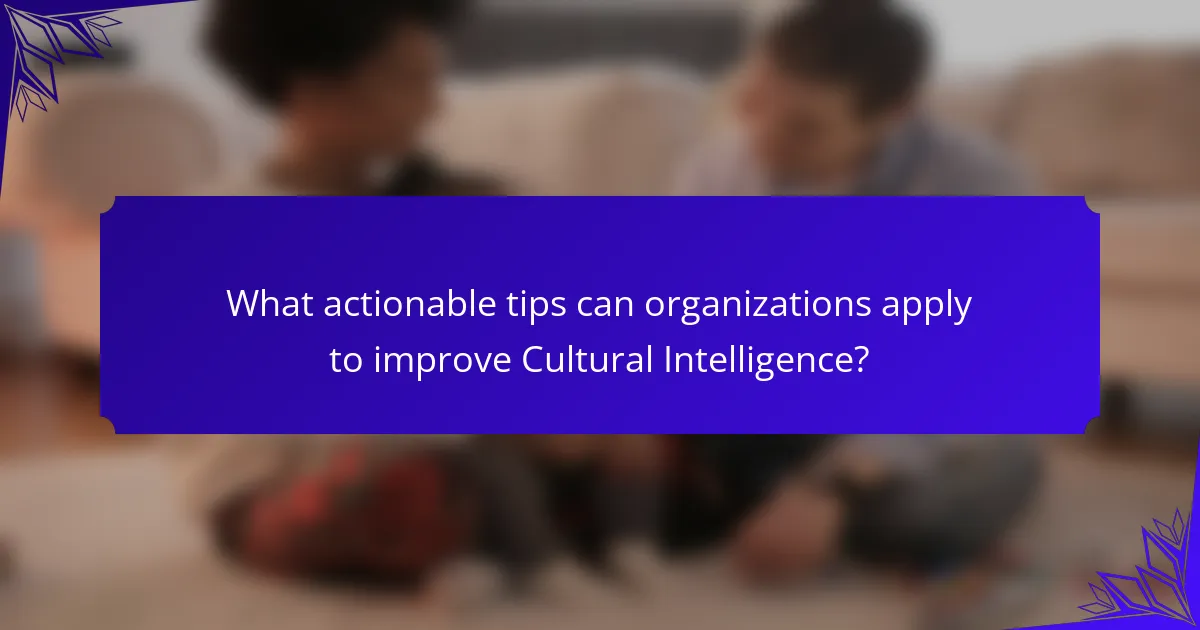
What actionable tips can organizations apply to improve Cultural Intelligence?
Organizations can enhance Cultural Intelligence by implementing targeted training programs, fostering open communication, and promoting diversity. Training should focus on developing awareness of cultural differences and effective cross-cultural communication skills. Encouraging dialogue among employees from diverse backgrounds helps build understanding and respect. Additionally, integrating diverse perspectives into decision-making processes can lead to more innovative solutions. Prioritizing these strategies can significantly improve workplace dynamics and collaboration in global teams.
How can leaders model Cultural Intelligence effectively?
Leaders can model Cultural Intelligence effectively by demonstrating openness, adaptability, and respect for diverse perspectives. They should actively engage in cross-cultural interactions, seek feedback, and encourage inclusive practices. By fostering an environment that values cultural differences, leaders enhance team collaboration and innovation. Regular training and personal reflection on cultural biases can further deepen their understanding and effectiveness.
What are the key takeaways for promoting Cultural Intelligence in teams?
Promoting Cultural Intelligence in teams enhances collaboration and innovation. Key takeaways include fostering open communication, encouraging diverse perspectives, providing training on cultural awareness, and creating inclusive policies. These strategies build a culturally intelligent workplace, improving team dynamics and performance.
